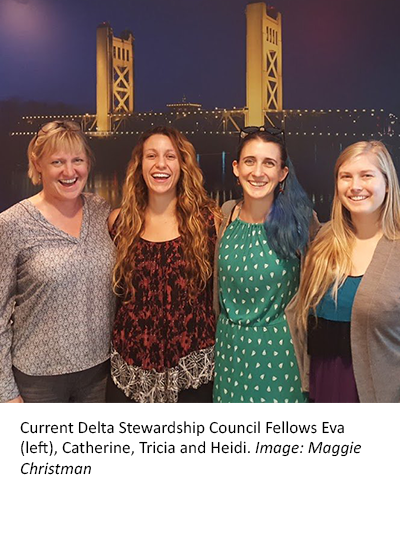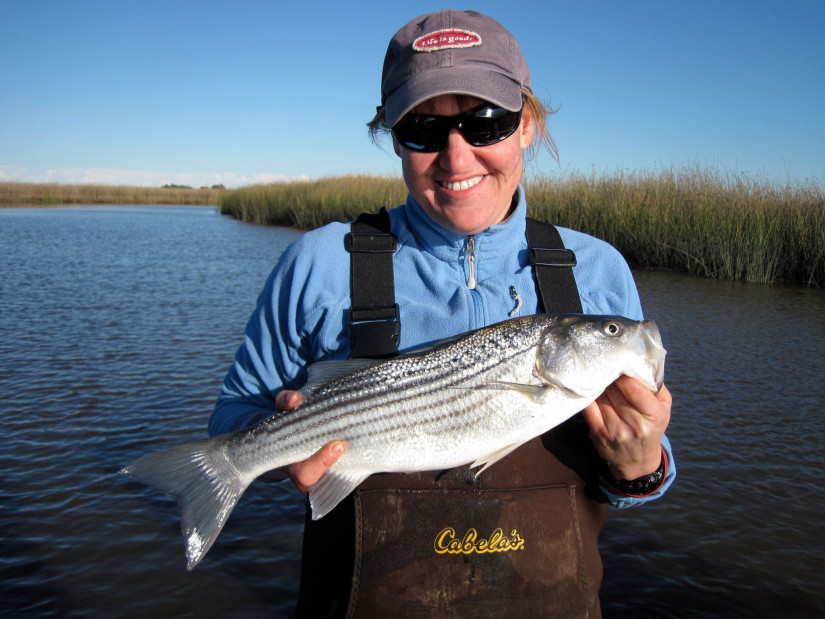
After the matching process, I arrived in the Planning and Performance Division of the Delta Stewardship Council as they were working on an amendment to the Delta Plan regarding conveyance, storage and operations, addressing considerations on how to best build and operate a new transport system and additional storage for California water supply while meeting the co-equal goals of the Delta Plan. The proposed and controversial WaterFix (or twin tunnel project) would bring water under the Sacramento-San Joaquin Delta for export south. It is one option for new conveyance, which meant this amendment drew a lot of interest from various stakeholders. This gave me a front row seat to the public process of creating agency recommendations on a subject where tension and emotions run high.
Here, I learned about public comment periods, responding to public comments, holding public workshops to give all stakeholders a say in the process, incorporating those comments in a new draft, and presenting this for further comments. The long process started to make sense, as new considerations and viewpoints came to light. I have always thought of myself as being able to look at a situation from many different angles—sometimes to the point of it being detrimental to my decision making—but simply listening to the variety of issues concerning water in the Delta has been an eye-opening experience. There seems to be as many views as there are people, as even within stakeholder groups there is not always agreement.
The last seven months here have taught me many things, but I think these are my highlights:
- I realized, through listening to public comments and workshops, that scientific research can be presented clearly and thoroughly, but people’s emotions affect their ability to take the information in. My thought had always been that if you explain the best available science well enough, people will understand and you can proceed with a discussion using that knowledge as a base, and if not, it was because you failed to communicate that science. This may work for simpler situations, but for complex decisions, like WaterFix, there are so many levels of concern.
Any large project has the potential of resulting in a loss of livelihood, sometimes enjoyed by generations of a family in the same location, loss of recreation, also enjoyed by generations together, and, in this case, loss of water quality which is already a concern in the Delta due to sea-level rise.
- I learned I need to take a step back from what I consider “common knowledge” to make sure it is. I learned that people working in the water distribution field did not necessarily know what I had considered the basic hydrology of the Delta. And stepping back, I realized that their main concern is to supply their customers with water, when they need it, at a reasonable price. Terms such as “environmental flows” which may stand in the way of that, do not adequately describe their purpose, and are naturally seen as an obstacle.
At a conference I attended (where I did not mention my study species, delta smelt, for 3 days, because I wanted people to talk to me), I had many interesting conversations; sometimes over Google Earth, about flows, tidal interactions, salt water intrusion, farming the Delta etc. The most interesting comment I had was “but the ocean ends at the Golden Gate” while talking about the salinity in the San Francisco Estuary and Delta. In the suggestion section of the end-of-conference survey, I suggested including a hydrologist as a speaker next year, for a basic introduction to the Delta hydrology, which may facilitate good conversations.
- I learned that when you bring different stakeholder groups together, especially in close quarters like a bus, a greater understanding happens. It becomes personal. I had the opportunity to go on the Bay-Delta Tour through the Water Education Foundation. It was an intense 3-day tour, covering the Delta, from Stockton to Sausalito. (I would highly recommend this tour to anyone, whether working in the Delta or not). To ensure all viewpoints are heard from, the speakers and guides cover the spectrum; irrigation district managers, Delta farmers, agency representatives from Bureau of Reclamation, California Department of Fish & Wildlife, Department of Water Resources, Delta Stewardship Council, Delta Protection Commission, and different consulting firms. Participants ranged from Central Valley farmers and students, to attorneys and employees from state, federal and municipal agencies.
One of my strongest memories is a meeting with a salmon fisherman, who had yet to work one day this year since low salmon stocks forced closing of the fishery, explaining the importance of Delta environmental flows to his livelihood and the conversations this started among the participants. Meeting the people that had other water needs was a very powerful tool to engage people in conversations about this limited resource and the issues they thought they had made up their minds about.
When it comes to California water it is easy to focus on the problems (there are so many!) and while they need to be solved, other things bring hope. During these months, I have also listened to collaboration and education resulting in some pretty cool things! I have met farmers from Israel who grow rice commercially, using underground drip irrigations in the desert, Central Valley farmers using the farm’s cow manure to fertilize feed crop for that cattle, through the drip irrigation watering the fields, and toured the San Diego facility completely recycling wastewater to drinking water, and had a glass! The time as a fellow has allowed me to understand why the policy process necessarily takes so long and that good ideas for conservation and collaboration comes from many different places.


Written by Eva Bush



